Current Developments in Accounting Thought: A Detailed Report
VerifiedAdded on 2023/06/05
|22
|4574
|104
Report
AI Summary
This report provides an analysis of current developments in accounting, focusing on two key areas: ethical considerations and fair value measurement. The first part of the report examines a case involving an accountant facing trial for authorizing false and misleading invoices, violating the Corporations Act 2001 and APES 110 code of ethics. It discusses the implications of these actions and potential outcomes of the trial. The second part of the report focuses on IFRS 13, Fair Value Measurement, and the post-implementation review process. It explores the standard's requirements, stakeholder concerns, and the arguments for and against the guidelines, including how regulations can better portray a true and fair picture of an organization. The report also evaluates regulation theories and provides a conclusion on the discussed topics.
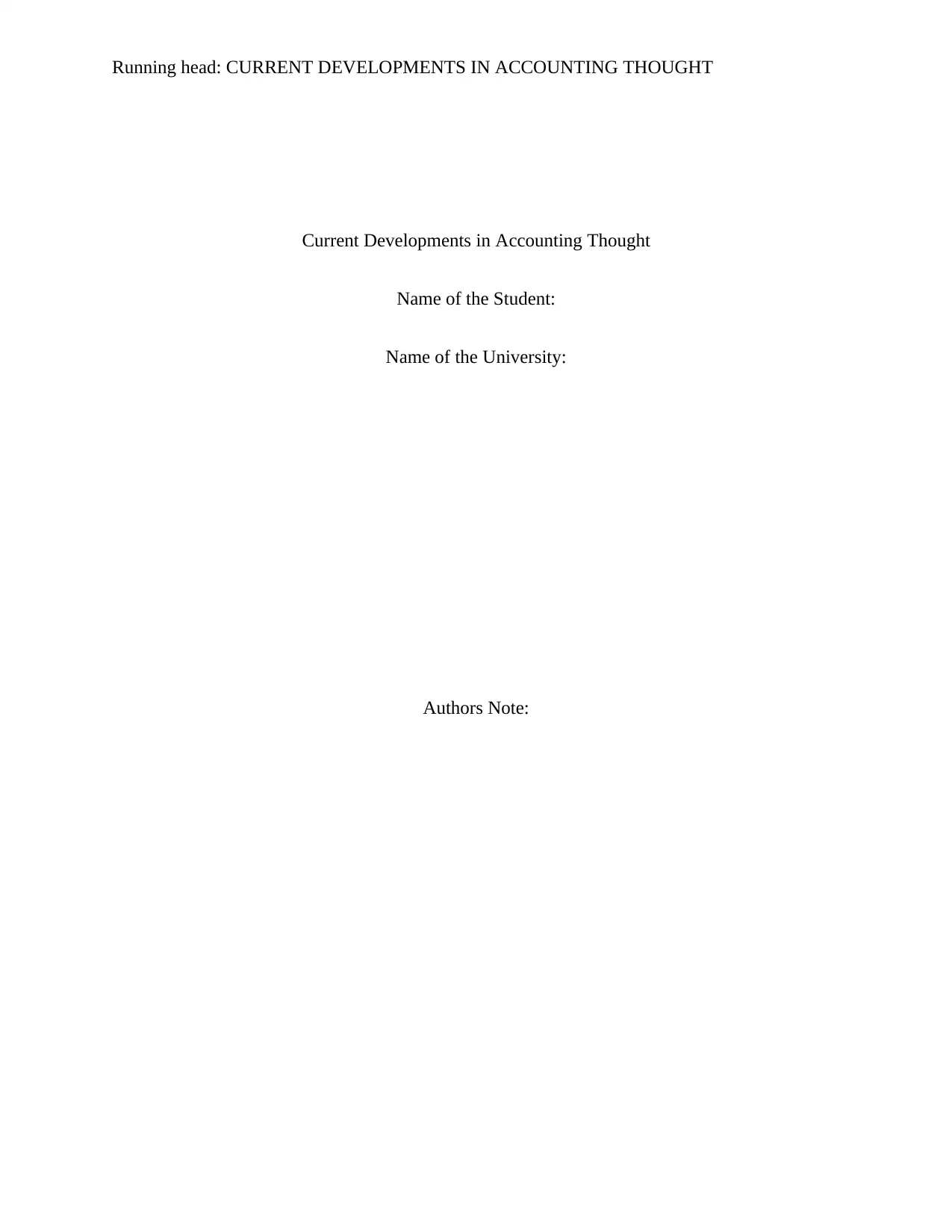
Running head: CURRENT DEVELOPMENTS IN ACCOUNTING THOUGHT
Current Developments in Accounting Thought
Name of the Student:
Name of the University:
Authors Note:
Current Developments in Accounting Thought
Name of the Student:
Name of the University:
Authors Note:
Paraphrase This Document
Need a fresh take? Get an instant paraphrase of this document with our AI Paraphraser
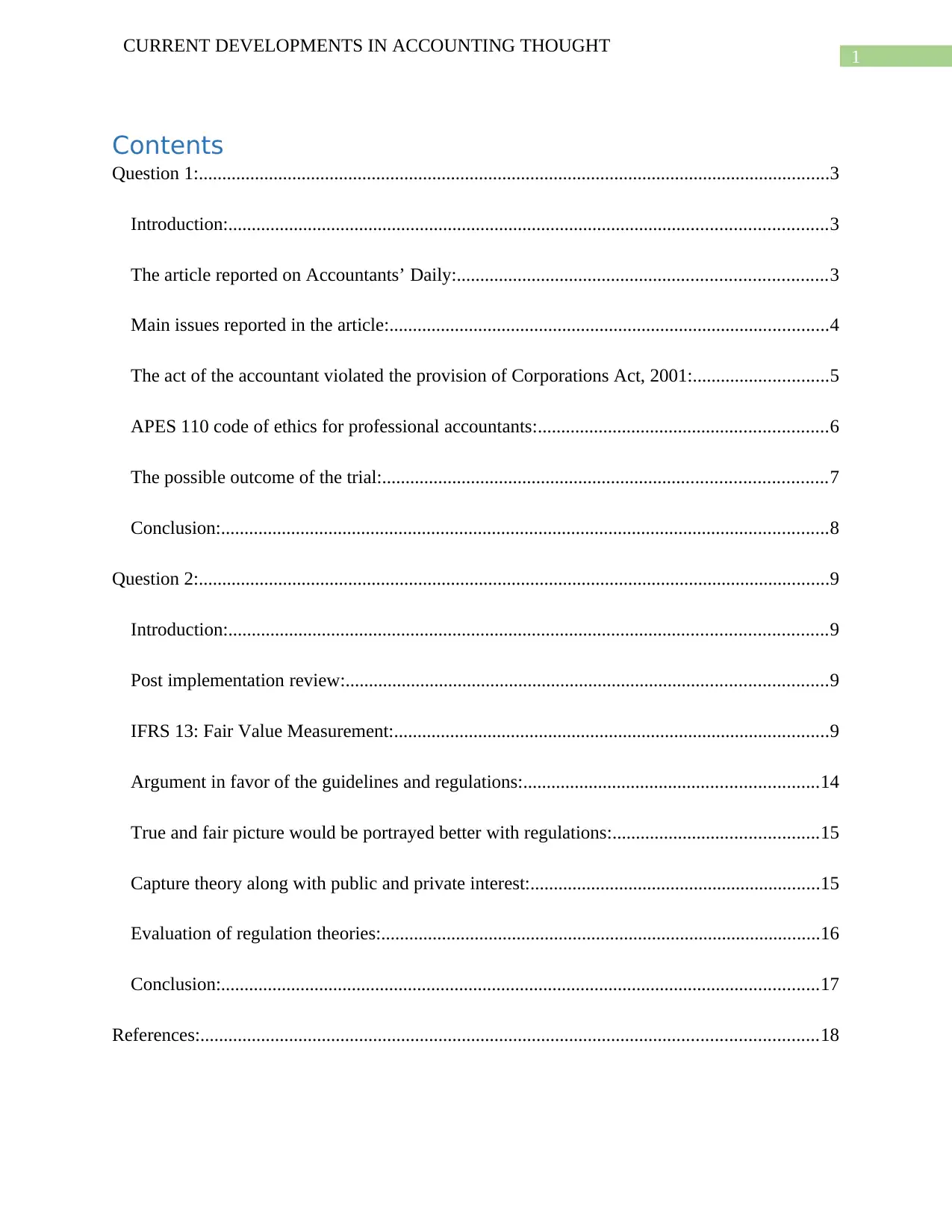
1
CURRENT DEVELOPMENTS IN ACCOUNTING THOUGHT
Contents
Question 1:.......................................................................................................................................3
Introduction:................................................................................................................................3
The article reported on Accountants’ Daily:...............................................................................3
Main issues reported in the article:..............................................................................................4
The act of the accountant violated the provision of Corporations Act, 2001:.............................5
APES 110 code of ethics for professional accountants:..............................................................6
The possible outcome of the trial:...............................................................................................7
Conclusion:..................................................................................................................................8
Question 2:.......................................................................................................................................9
Introduction:................................................................................................................................9
Post implementation review:.......................................................................................................9
IFRS 13: Fair Value Measurement:.............................................................................................9
Argument in favor of the guidelines and regulations:...............................................................14
True and fair picture would be portrayed better with regulations:............................................15
Capture theory along with public and private interest:..............................................................15
Evaluation of regulation theories:..............................................................................................16
Conclusion:................................................................................................................................17
References:....................................................................................................................................18
CURRENT DEVELOPMENTS IN ACCOUNTING THOUGHT
Contents
Question 1:.......................................................................................................................................3
Introduction:................................................................................................................................3
The article reported on Accountants’ Daily:...............................................................................3
Main issues reported in the article:..............................................................................................4
The act of the accountant violated the provision of Corporations Act, 2001:.............................5
APES 110 code of ethics for professional accountants:..............................................................6
The possible outcome of the trial:...............................................................................................7
Conclusion:..................................................................................................................................8
Question 2:.......................................................................................................................................9
Introduction:................................................................................................................................9
Post implementation review:.......................................................................................................9
IFRS 13: Fair Value Measurement:.............................................................................................9
Argument in favor of the guidelines and regulations:...............................................................14
True and fair picture would be portrayed better with regulations:............................................15
Capture theory along with public and private interest:..............................................................15
Evaluation of regulation theories:..............................................................................................16
Conclusion:................................................................................................................................17
References:....................................................................................................................................18
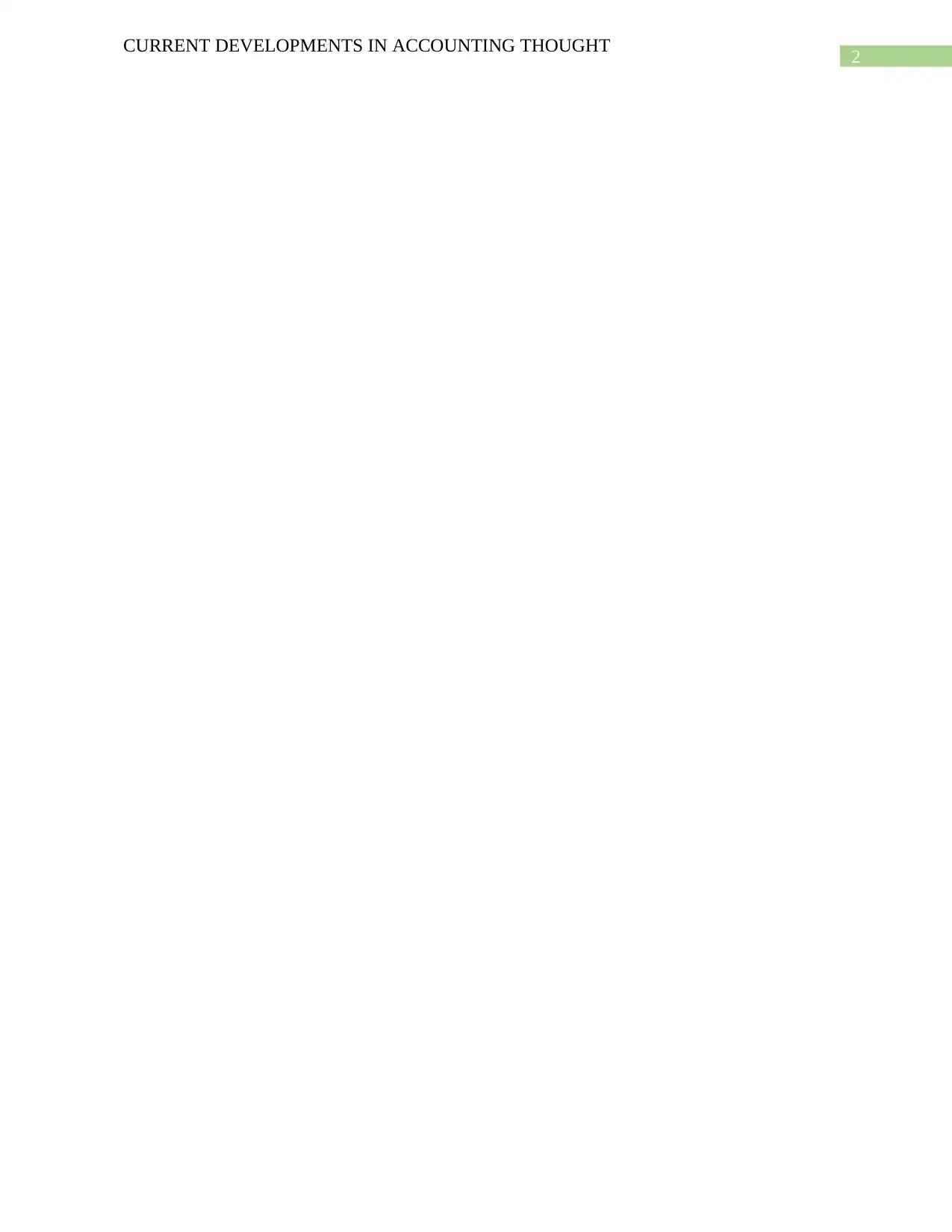
2
CURRENT DEVELOPMENTS IN ACCOUNTING THOUGHT
CURRENT DEVELOPMENTS IN ACCOUNTING THOUGHT
⊘ This is a preview!⊘
Do you want full access?
Subscribe today to unlock all pages.

Trusted by 1+ million students worldwide
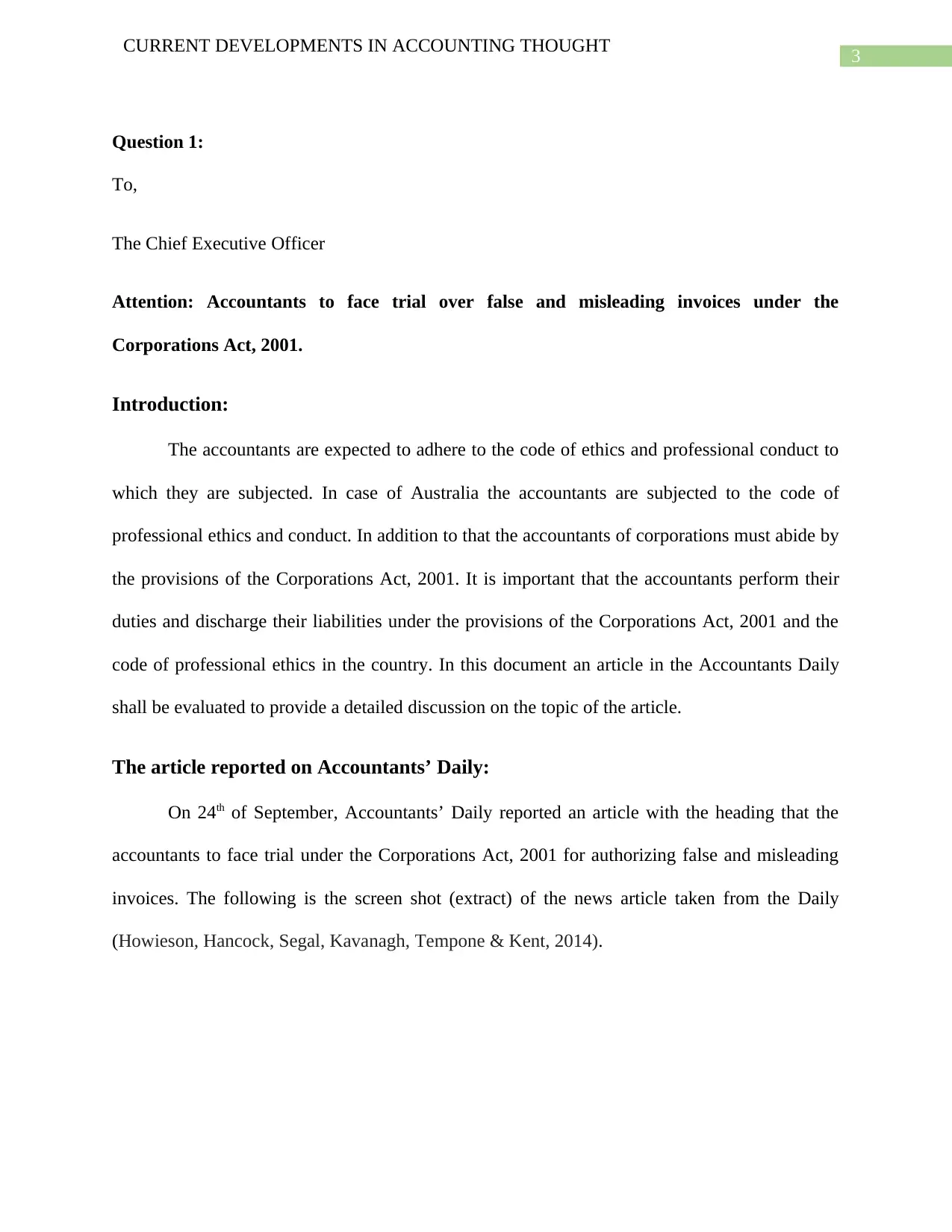
3
CURRENT DEVELOPMENTS IN ACCOUNTING THOUGHT
Question 1:
To,
The Chief Executive Officer
Attention: Accountants to face trial over false and misleading invoices under the
Corporations Act, 2001.
Introduction:
The accountants are expected to adhere to the code of ethics and professional conduct to
which they are subjected. In case of Australia the accountants are subjected to the code of
professional ethics and conduct. In addition to that the accountants of corporations must abide by
the provisions of the Corporations Act, 2001. It is important that the accountants perform their
duties and discharge their liabilities under the provisions of the Corporations Act, 2001 and the
code of professional ethics in the country. In this document an article in the Accountants Daily
shall be evaluated to provide a detailed discussion on the topic of the article.
The article reported on Accountants’ Daily:
On 24th of September, Accountants’ Daily reported an article with the heading that the
accountants to face trial under the Corporations Act, 2001 for authorizing false and misleading
invoices. The following is the screen shot (extract) of the news article taken from the Daily
(Howieson, Hancock, Segal, Kavanagh, Tempone & Kent, 2014).
CURRENT DEVELOPMENTS IN ACCOUNTING THOUGHT
Question 1:
To,
The Chief Executive Officer
Attention: Accountants to face trial over false and misleading invoices under the
Corporations Act, 2001.
Introduction:
The accountants are expected to adhere to the code of ethics and professional conduct to
which they are subjected. In case of Australia the accountants are subjected to the code of
professional ethics and conduct. In addition to that the accountants of corporations must abide by
the provisions of the Corporations Act, 2001. It is important that the accountants perform their
duties and discharge their liabilities under the provisions of the Corporations Act, 2001 and the
code of professional ethics in the country. In this document an article in the Accountants Daily
shall be evaluated to provide a detailed discussion on the topic of the article.
The article reported on Accountants’ Daily:
On 24th of September, Accountants’ Daily reported an article with the heading that the
accountants to face trial under the Corporations Act, 2001 for authorizing false and misleading
invoices. The following is the screen shot (extract) of the news article taken from the Daily
(Howieson, Hancock, Segal, Kavanagh, Tempone & Kent, 2014).
Paraphrase This Document
Need a fresh take? Get an instant paraphrase of this document with our AI Paraphraser
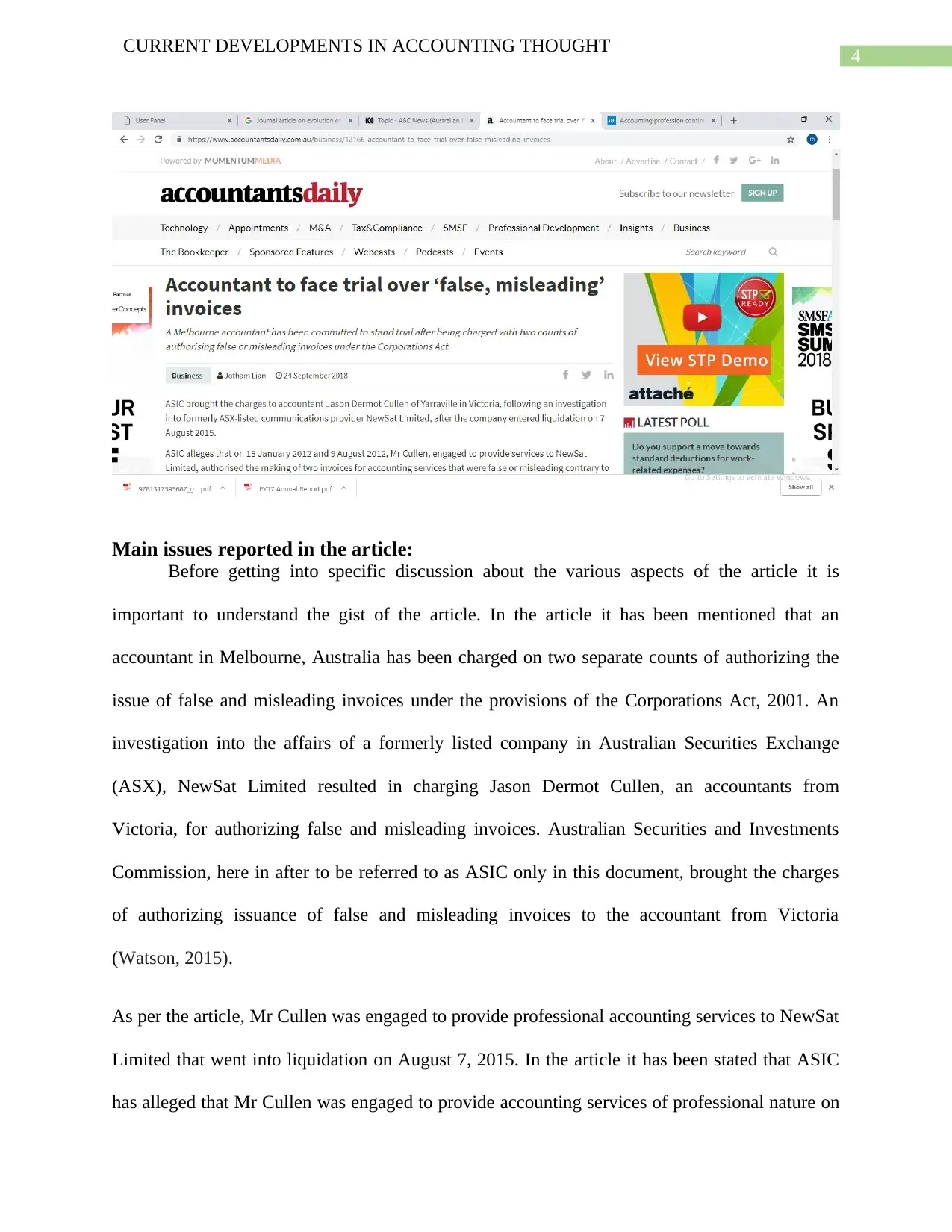
4
CURRENT DEVELOPMENTS IN ACCOUNTING THOUGHT
Main issues reported in the article:
Before getting into specific discussion about the various aspects of the article it is
important to understand the gist of the article. In the article it has been mentioned that an
accountant in Melbourne, Australia has been charged on two separate counts of authorizing the
issue of false and misleading invoices under the provisions of the Corporations Act, 2001. An
investigation into the affairs of a formerly listed company in Australian Securities Exchange
(ASX), NewSat Limited resulted in charging Jason Dermot Cullen, an accountants from
Victoria, for authorizing false and misleading invoices. Australian Securities and Investments
Commission, here in after to be referred to as ASIC only in this document, brought the charges
of authorizing issuance of false and misleading invoices to the accountant from Victoria
(Watson, 2015).
As per the article, Mr Cullen was engaged to provide professional accounting services to NewSat
Limited that went into liquidation on August 7, 2015. In the article it has been stated that ASIC
has alleged that Mr Cullen was engaged to provide accounting services of professional nature on
CURRENT DEVELOPMENTS IN ACCOUNTING THOUGHT
Main issues reported in the article:
Before getting into specific discussion about the various aspects of the article it is
important to understand the gist of the article. In the article it has been mentioned that an
accountant in Melbourne, Australia has been charged on two separate counts of authorizing the
issue of false and misleading invoices under the provisions of the Corporations Act, 2001. An
investigation into the affairs of a formerly listed company in Australian Securities Exchange
(ASX), NewSat Limited resulted in charging Jason Dermot Cullen, an accountants from
Victoria, for authorizing false and misleading invoices. Australian Securities and Investments
Commission, here in after to be referred to as ASIC only in this document, brought the charges
of authorizing issuance of false and misleading invoices to the accountant from Victoria
(Watson, 2015).
As per the article, Mr Cullen was engaged to provide professional accounting services to NewSat
Limited that went into liquidation on August 7, 2015. In the article it has been stated that ASIC
has alleged that Mr Cullen was engaged to provide accounting services of professional nature on
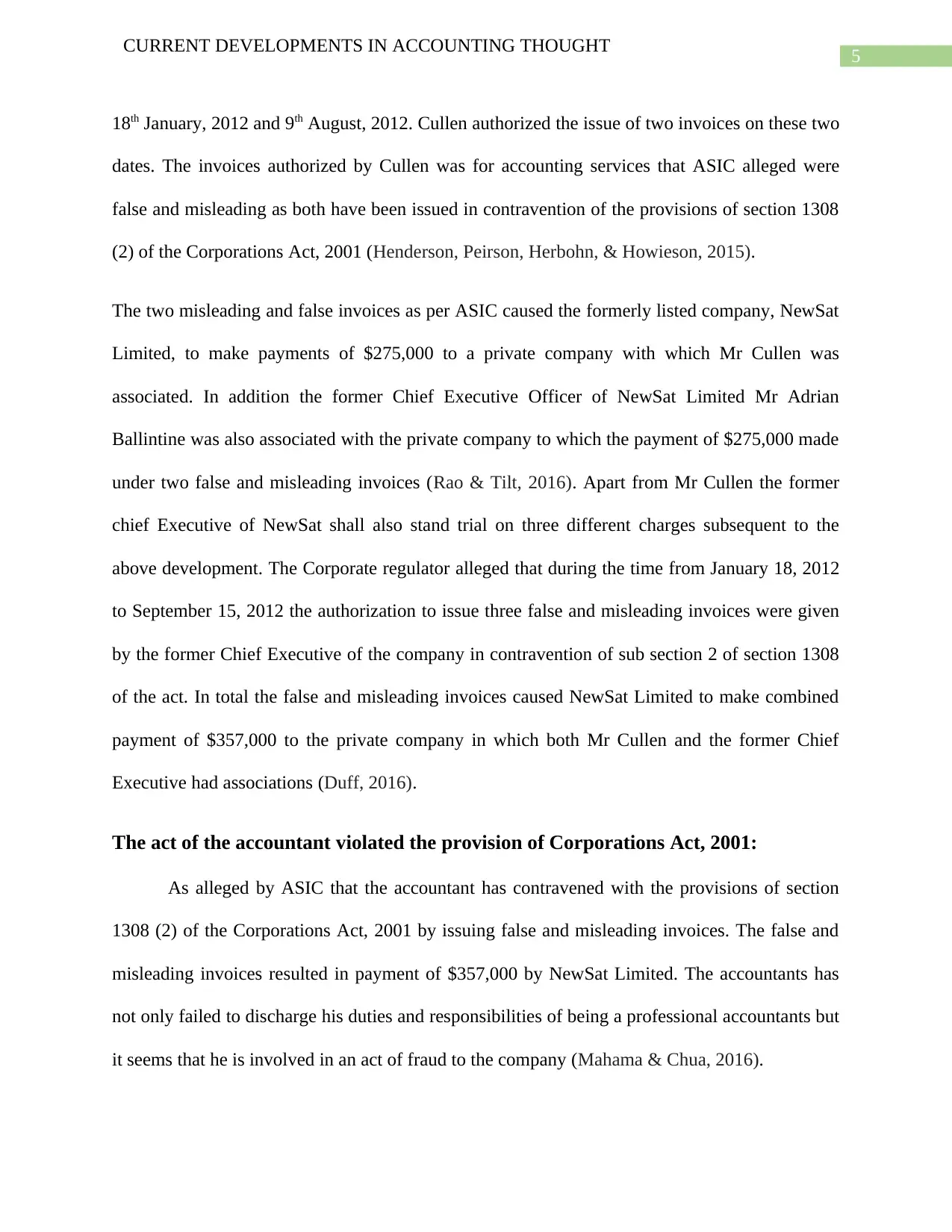
5
CURRENT DEVELOPMENTS IN ACCOUNTING THOUGHT
18th January, 2012 and 9th August, 2012. Cullen authorized the issue of two invoices on these two
dates. The invoices authorized by Cullen was for accounting services that ASIC alleged were
false and misleading as both have been issued in contravention of the provisions of section 1308
(2) of the Corporations Act, 2001 (Henderson, Peirson, Herbohn, & Howieson, 2015).
The two misleading and false invoices as per ASIC caused the formerly listed company, NewSat
Limited, to make payments of $275,000 to a private company with which Mr Cullen was
associated. In addition the former Chief Executive Officer of NewSat Limited Mr Adrian
Ballintine was also associated with the private company to which the payment of $275,000 made
under two false and misleading invoices (Rao & Tilt, 2016). Apart from Mr Cullen the former
chief Executive of NewSat shall also stand trial on three different charges subsequent to the
above development. The Corporate regulator alleged that during the time from January 18, 2012
to September 15, 2012 the authorization to issue three false and misleading invoices were given
by the former Chief Executive of the company in contravention of sub section 2 of section 1308
of the act. In total the false and misleading invoices caused NewSat Limited to make combined
payment of $357,000 to the private company in which both Mr Cullen and the former Chief
Executive had associations (Duff, 2016).
The act of the accountant violated the provision of Corporations Act, 2001:
As alleged by ASIC that the accountant has contravened with the provisions of section
1308 (2) of the Corporations Act, 2001 by issuing false and misleading invoices. The false and
misleading invoices resulted in payment of $357,000 by NewSat Limited. The accountants has
not only failed to discharge his duties and responsibilities of being a professional accountants but
it seems that he is involved in an act of fraud to the company (Mahama & Chua, 2016).
CURRENT DEVELOPMENTS IN ACCOUNTING THOUGHT
18th January, 2012 and 9th August, 2012. Cullen authorized the issue of two invoices on these two
dates. The invoices authorized by Cullen was for accounting services that ASIC alleged were
false and misleading as both have been issued in contravention of the provisions of section 1308
(2) of the Corporations Act, 2001 (Henderson, Peirson, Herbohn, & Howieson, 2015).
The two misleading and false invoices as per ASIC caused the formerly listed company, NewSat
Limited, to make payments of $275,000 to a private company with which Mr Cullen was
associated. In addition the former Chief Executive Officer of NewSat Limited Mr Adrian
Ballintine was also associated with the private company to which the payment of $275,000 made
under two false and misleading invoices (Rao & Tilt, 2016). Apart from Mr Cullen the former
chief Executive of NewSat shall also stand trial on three different charges subsequent to the
above development. The Corporate regulator alleged that during the time from January 18, 2012
to September 15, 2012 the authorization to issue three false and misleading invoices were given
by the former Chief Executive of the company in contravention of sub section 2 of section 1308
of the act. In total the false and misleading invoices caused NewSat Limited to make combined
payment of $357,000 to the private company in which both Mr Cullen and the former Chief
Executive had associations (Duff, 2016).
The act of the accountant violated the provision of Corporations Act, 2001:
As alleged by ASIC that the accountant has contravened with the provisions of section
1308 (2) of the Corporations Act, 2001 by issuing false and misleading invoices. The false and
misleading invoices resulted in payment of $357,000 by NewSat Limited. The accountants has
not only failed to discharge his duties and responsibilities of being a professional accountants but
it seems that he is involved in an act of fraud to the company (Mahama & Chua, 2016).
⊘ This is a preview!⊘
Do you want full access?
Subscribe today to unlock all pages.

Trusted by 1+ million students worldwide
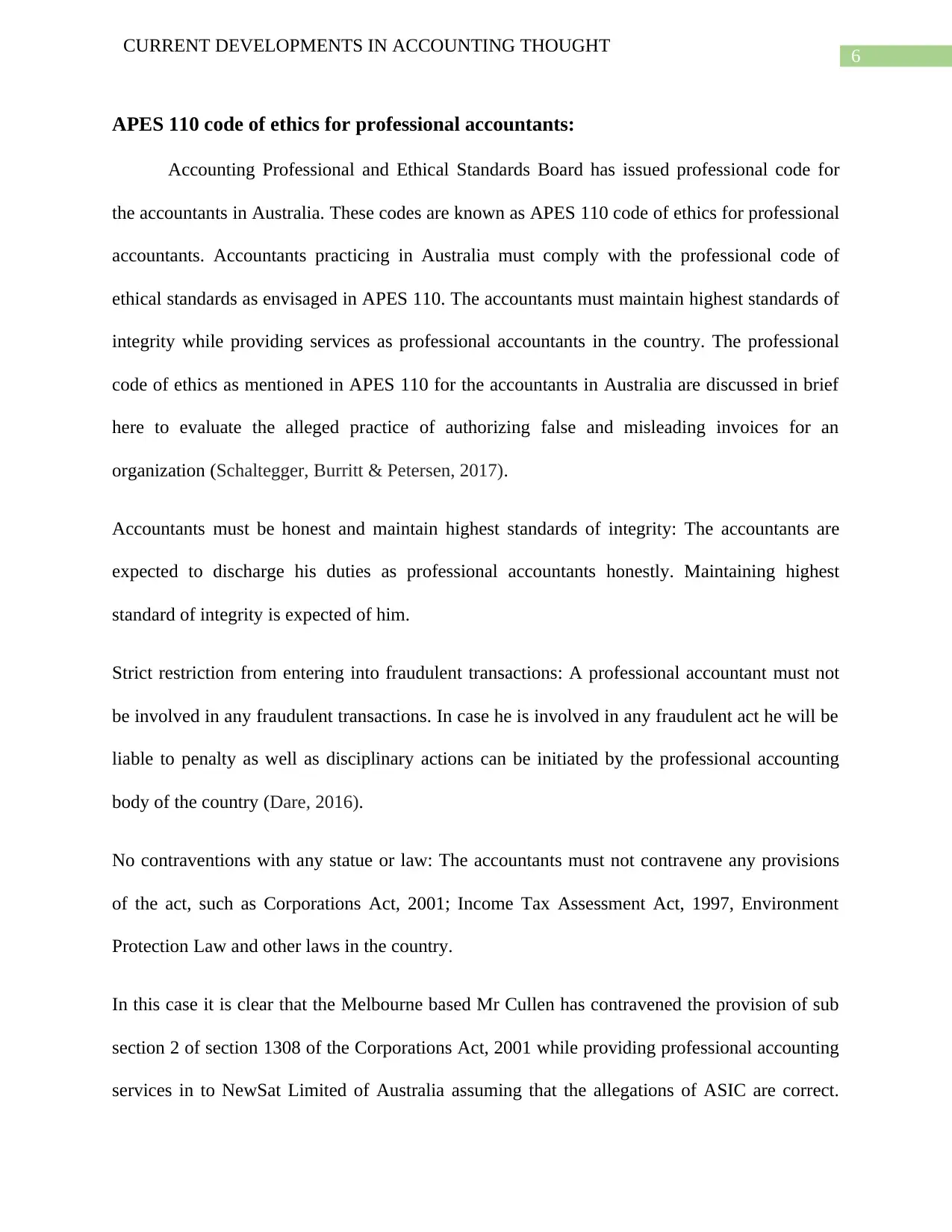
6
CURRENT DEVELOPMENTS IN ACCOUNTING THOUGHT
APES 110 code of ethics for professional accountants:
Accounting Professional and Ethical Standards Board has issued professional code for
the accountants in Australia. These codes are known as APES 110 code of ethics for professional
accountants. Accountants practicing in Australia must comply with the professional code of
ethical standards as envisaged in APES 110. The accountants must maintain highest standards of
integrity while providing services as professional accountants in the country. The professional
code of ethics as mentioned in APES 110 for the accountants in Australia are discussed in brief
here to evaluate the alleged practice of authorizing false and misleading invoices for an
organization (Schaltegger, Burritt & Petersen, 2017).
Accountants must be honest and maintain highest standards of integrity: The accountants are
expected to discharge his duties as professional accountants honestly. Maintaining highest
standard of integrity is expected of him.
Strict restriction from entering into fraudulent transactions: A professional accountant must not
be involved in any fraudulent transactions. In case he is involved in any fraudulent act he will be
liable to penalty as well as disciplinary actions can be initiated by the professional accounting
body of the country (Dare, 2016).
No contraventions with any statue or law: The accountants must not contravene any provisions
of the act, such as Corporations Act, 2001; Income Tax Assessment Act, 1997, Environment
Protection Law and other laws in the country.
In this case it is clear that the Melbourne based Mr Cullen has contravened the provision of sub
section 2 of section 1308 of the Corporations Act, 2001 while providing professional accounting
services in to NewSat Limited of Australia assuming that the allegations of ASIC are correct.
CURRENT DEVELOPMENTS IN ACCOUNTING THOUGHT
APES 110 code of ethics for professional accountants:
Accounting Professional and Ethical Standards Board has issued professional code for
the accountants in Australia. These codes are known as APES 110 code of ethics for professional
accountants. Accountants practicing in Australia must comply with the professional code of
ethical standards as envisaged in APES 110. The accountants must maintain highest standards of
integrity while providing services as professional accountants in the country. The professional
code of ethics as mentioned in APES 110 for the accountants in Australia are discussed in brief
here to evaluate the alleged practice of authorizing false and misleading invoices for an
organization (Schaltegger, Burritt & Petersen, 2017).
Accountants must be honest and maintain highest standards of integrity: The accountants are
expected to discharge his duties as professional accountants honestly. Maintaining highest
standard of integrity is expected of him.
Strict restriction from entering into fraudulent transactions: A professional accountant must not
be involved in any fraudulent transactions. In case he is involved in any fraudulent act he will be
liable to penalty as well as disciplinary actions can be initiated by the professional accounting
body of the country (Dare, 2016).
No contraventions with any statue or law: The accountants must not contravene any provisions
of the act, such as Corporations Act, 2001; Income Tax Assessment Act, 1997, Environment
Protection Law and other laws in the country.
In this case it is clear that the Melbourne based Mr Cullen has contravened the provision of sub
section 2 of section 1308 of the Corporations Act, 2001 while providing professional accounting
services in to NewSat Limited of Australia assuming that the allegations of ASIC are correct.
Paraphrase This Document
Need a fresh take? Get an instant paraphrase of this document with our AI Paraphraser
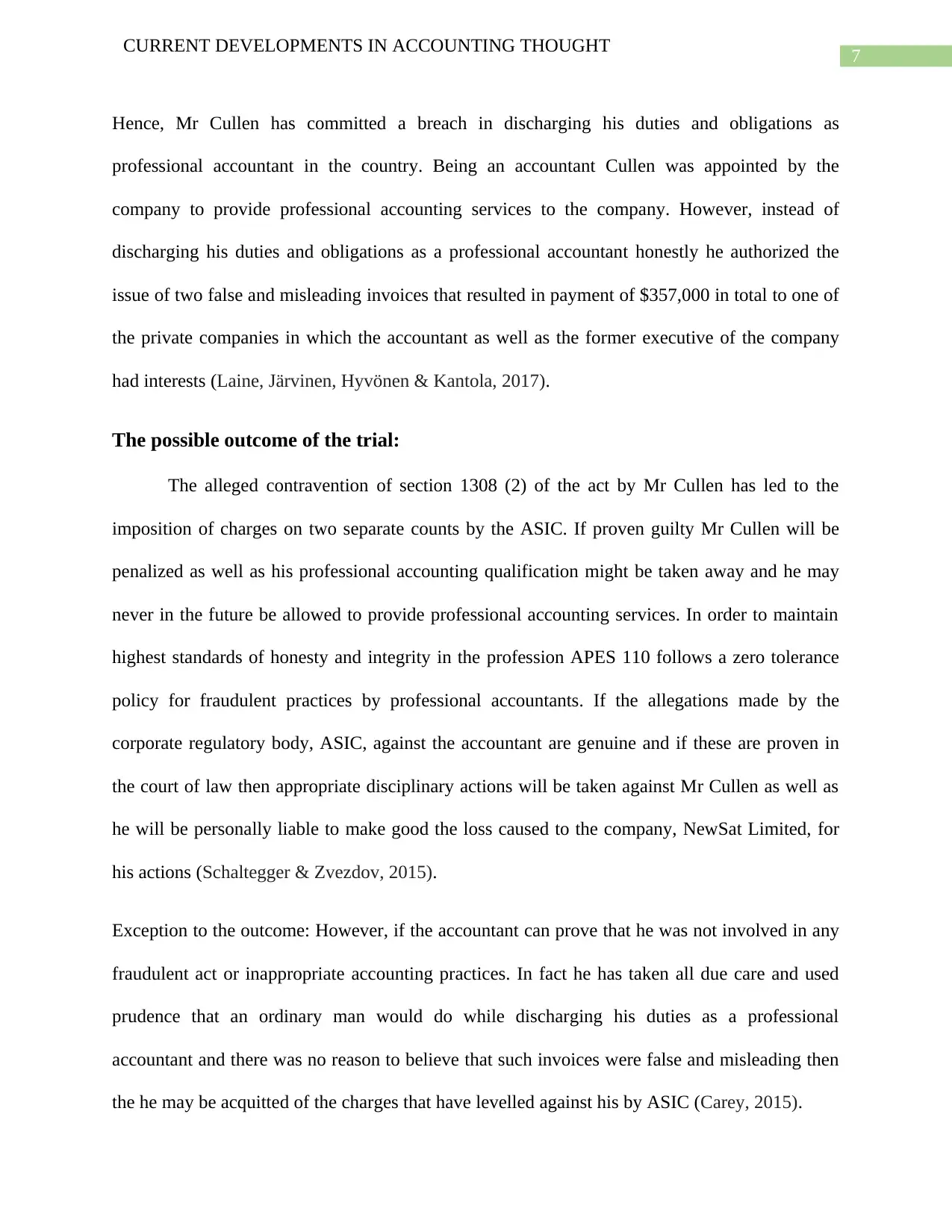
7
CURRENT DEVELOPMENTS IN ACCOUNTING THOUGHT
Hence, Mr Cullen has committed a breach in discharging his duties and obligations as
professional accountant in the country. Being an accountant Cullen was appointed by the
company to provide professional accounting services to the company. However, instead of
discharging his duties and obligations as a professional accountant honestly he authorized the
issue of two false and misleading invoices that resulted in payment of $357,000 in total to one of
the private companies in which the accountant as well as the former executive of the company
had interests (Laine, Järvinen, Hyvönen & Kantola, 2017).
The possible outcome of the trial:
The alleged contravention of section 1308 (2) of the act by Mr Cullen has led to the
imposition of charges on two separate counts by the ASIC. If proven guilty Mr Cullen will be
penalized as well as his professional accounting qualification might be taken away and he may
never in the future be allowed to provide professional accounting services. In order to maintain
highest standards of honesty and integrity in the profession APES 110 follows a zero tolerance
policy for fraudulent practices by professional accountants. If the allegations made by the
corporate regulatory body, ASIC, against the accountant are genuine and if these are proven in
the court of law then appropriate disciplinary actions will be taken against Mr Cullen as well as
he will be personally liable to make good the loss caused to the company, NewSat Limited, for
his actions (Schaltegger & Zvezdov, 2015).
Exception to the outcome: However, if the accountant can prove that he was not involved in any
fraudulent act or inappropriate accounting practices. In fact he has taken all due care and used
prudence that an ordinary man would do while discharging his duties as a professional
accountant and there was no reason to believe that such invoices were false and misleading then
the he may be acquitted of the charges that have levelled against his by ASIC (Carey, 2015).
CURRENT DEVELOPMENTS IN ACCOUNTING THOUGHT
Hence, Mr Cullen has committed a breach in discharging his duties and obligations as
professional accountant in the country. Being an accountant Cullen was appointed by the
company to provide professional accounting services to the company. However, instead of
discharging his duties and obligations as a professional accountant honestly he authorized the
issue of two false and misleading invoices that resulted in payment of $357,000 in total to one of
the private companies in which the accountant as well as the former executive of the company
had interests (Laine, Järvinen, Hyvönen & Kantola, 2017).
The possible outcome of the trial:
The alleged contravention of section 1308 (2) of the act by Mr Cullen has led to the
imposition of charges on two separate counts by the ASIC. If proven guilty Mr Cullen will be
penalized as well as his professional accounting qualification might be taken away and he may
never in the future be allowed to provide professional accounting services. In order to maintain
highest standards of honesty and integrity in the profession APES 110 follows a zero tolerance
policy for fraudulent practices by professional accountants. If the allegations made by the
corporate regulatory body, ASIC, against the accountant are genuine and if these are proven in
the court of law then appropriate disciplinary actions will be taken against Mr Cullen as well as
he will be personally liable to make good the loss caused to the company, NewSat Limited, for
his actions (Schaltegger & Zvezdov, 2015).
Exception to the outcome: However, if the accountant can prove that he was not involved in any
fraudulent act or inappropriate accounting practices. In fact he has taken all due care and used
prudence that an ordinary man would do while discharging his duties as a professional
accountant and there was no reason to believe that such invoices were false and misleading then
the he may be acquitted of the charges that have levelled against his by ASIC (Carey, 2015).
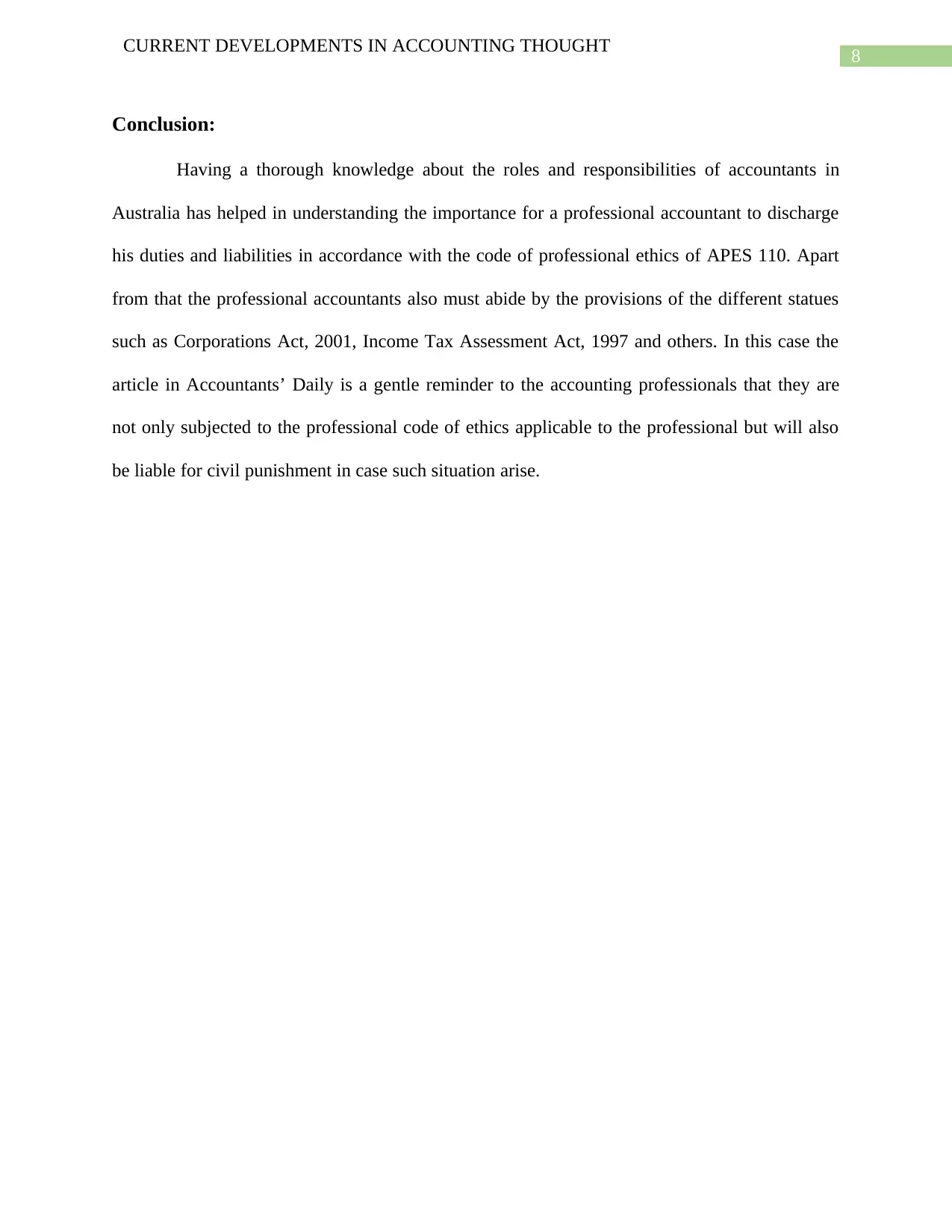
8
CURRENT DEVELOPMENTS IN ACCOUNTING THOUGHT
Conclusion:
Having a thorough knowledge about the roles and responsibilities of accountants in
Australia has helped in understanding the importance for a professional accountant to discharge
his duties and liabilities in accordance with the code of professional ethics of APES 110. Apart
from that the professional accountants also must abide by the provisions of the different statues
such as Corporations Act, 2001, Income Tax Assessment Act, 1997 and others. In this case the
article in Accountants’ Daily is a gentle reminder to the accounting professionals that they are
not only subjected to the professional code of ethics applicable to the professional but will also
be liable for civil punishment in case such situation arise.
CURRENT DEVELOPMENTS IN ACCOUNTING THOUGHT
Conclusion:
Having a thorough knowledge about the roles and responsibilities of accountants in
Australia has helped in understanding the importance for a professional accountant to discharge
his duties and liabilities in accordance with the code of professional ethics of APES 110. Apart
from that the professional accountants also must abide by the provisions of the different statues
such as Corporations Act, 2001, Income Tax Assessment Act, 1997 and others. In this case the
article in Accountants’ Daily is a gentle reminder to the accounting professionals that they are
not only subjected to the professional code of ethics applicable to the professional but will also
be liable for civil punishment in case such situation arise.
⊘ This is a preview!⊘
Do you want full access?
Subscribe today to unlock all pages.

Trusted by 1+ million students worldwide
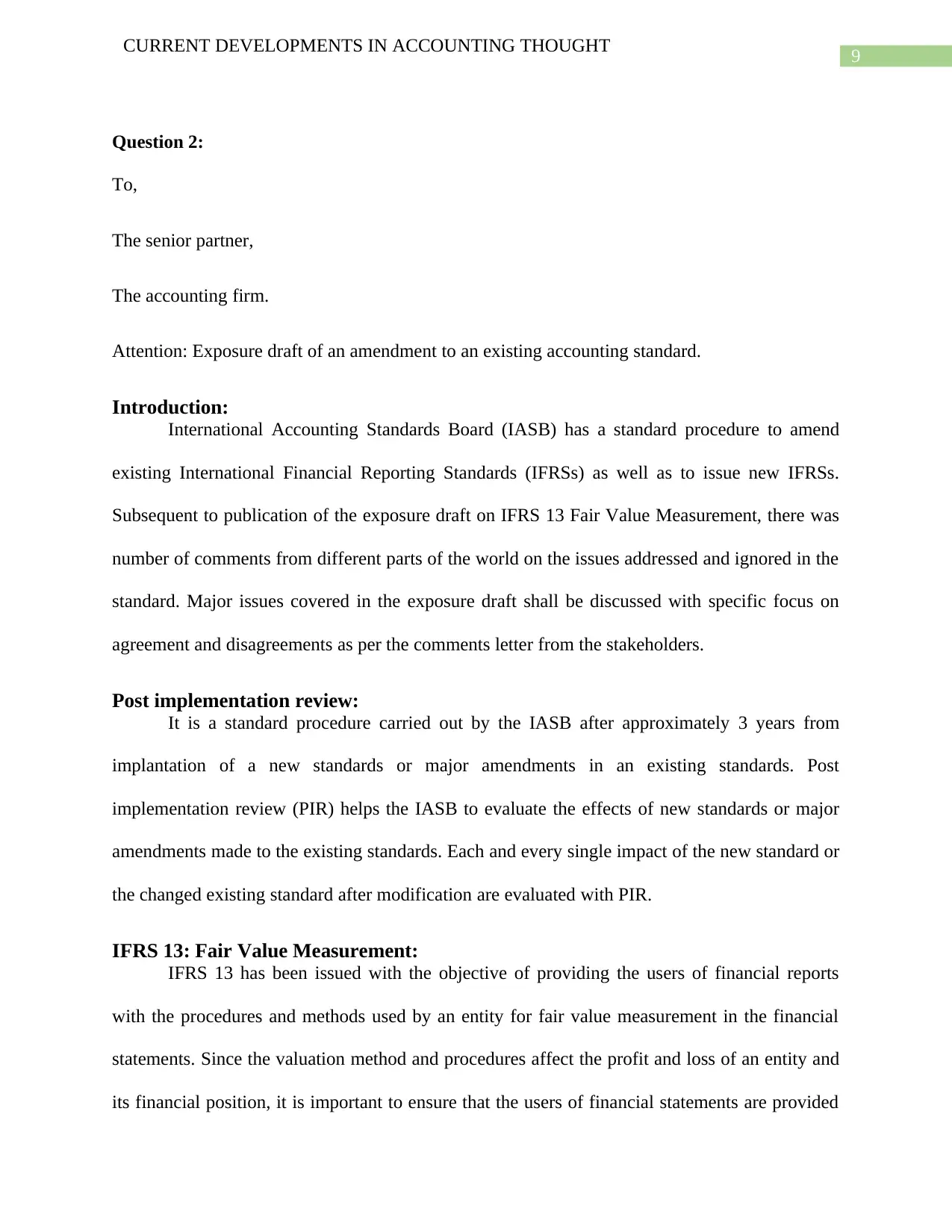
9
CURRENT DEVELOPMENTS IN ACCOUNTING THOUGHT
Question 2:
To,
The senior partner,
The accounting firm.
Attention: Exposure draft of an amendment to an existing accounting standard.
Introduction:
International Accounting Standards Board (IASB) has a standard procedure to amend
existing International Financial Reporting Standards (IFRSs) as well as to issue new IFRSs.
Subsequent to publication of the exposure draft on IFRS 13 Fair Value Measurement, there was
number of comments from different parts of the world on the issues addressed and ignored in the
standard. Major issues covered in the exposure draft shall be discussed with specific focus on
agreement and disagreements as per the comments letter from the stakeholders.
Post implementation review:
It is a standard procedure carried out by the IASB after approximately 3 years from
implantation of a new standards or major amendments in an existing standards. Post
implementation review (PIR) helps the IASB to evaluate the effects of new standards or major
amendments made to the existing standards. Each and every single impact of the new standard or
the changed existing standard after modification are evaluated with PIR.
IFRS 13: Fair Value Measurement:
IFRS 13 has been issued with the objective of providing the users of financial reports
with the procedures and methods used by an entity for fair value measurement in the financial
statements. Since the valuation method and procedures affect the profit and loss of an entity and
its financial position, it is important to ensure that the users of financial statements are provided
CURRENT DEVELOPMENTS IN ACCOUNTING THOUGHT
Question 2:
To,
The senior partner,
The accounting firm.
Attention: Exposure draft of an amendment to an existing accounting standard.
Introduction:
International Accounting Standards Board (IASB) has a standard procedure to amend
existing International Financial Reporting Standards (IFRSs) as well as to issue new IFRSs.
Subsequent to publication of the exposure draft on IFRS 13 Fair Value Measurement, there was
number of comments from different parts of the world on the issues addressed and ignored in the
standard. Major issues covered in the exposure draft shall be discussed with specific focus on
agreement and disagreements as per the comments letter from the stakeholders.
Post implementation review:
It is a standard procedure carried out by the IASB after approximately 3 years from
implantation of a new standards or major amendments in an existing standards. Post
implementation review (PIR) helps the IASB to evaluate the effects of new standards or major
amendments made to the existing standards. Each and every single impact of the new standard or
the changed existing standard after modification are evaluated with PIR.
IFRS 13: Fair Value Measurement:
IFRS 13 has been issued with the objective of providing the users of financial reports
with the procedures and methods used by an entity for fair value measurement in the financial
statements. Since the valuation method and procedures affect the profit and loss of an entity and
its financial position, it is important to ensure that the users of financial statements are provided
Paraphrase This Document
Need a fresh take? Get an instant paraphrase of this document with our AI Paraphraser
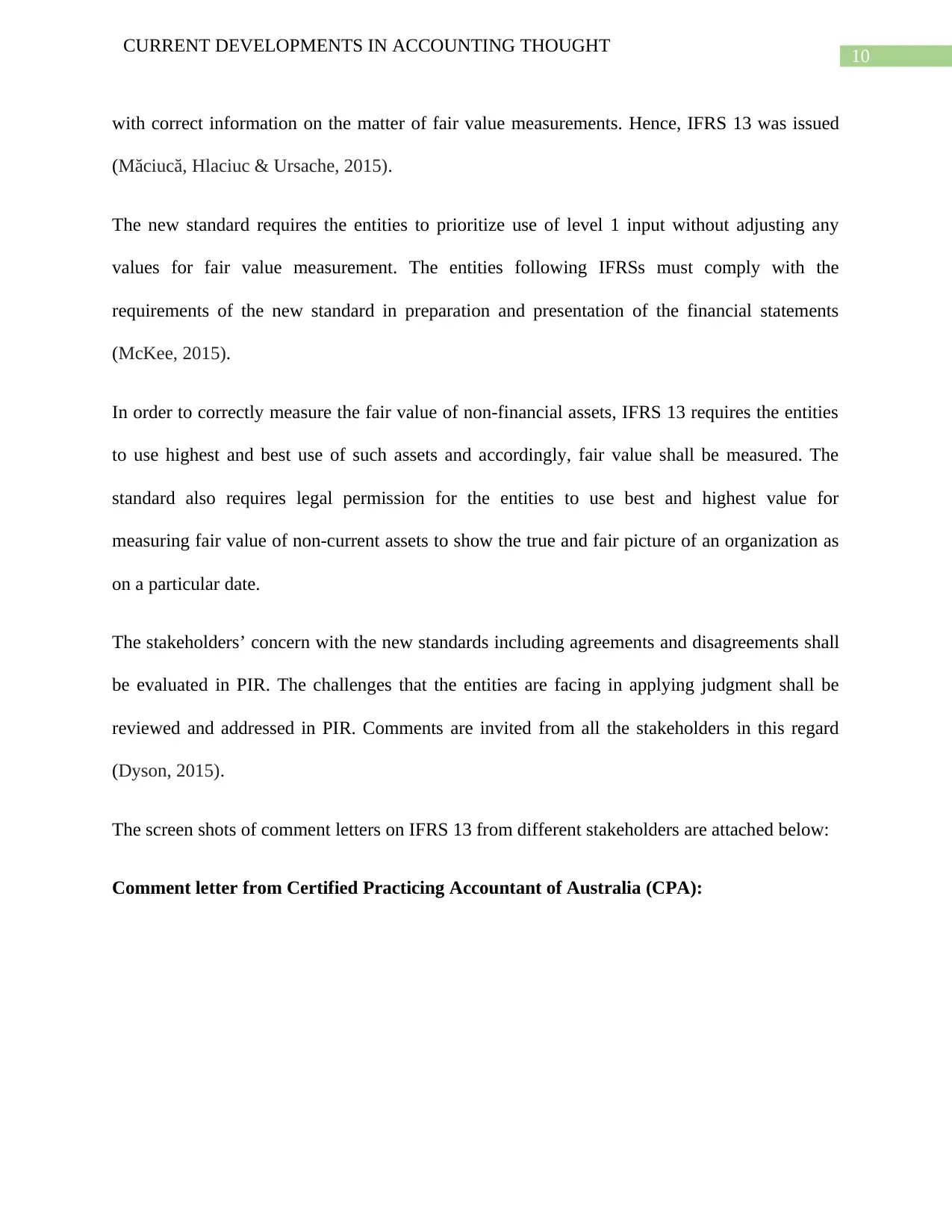
10
CURRENT DEVELOPMENTS IN ACCOUNTING THOUGHT
with correct information on the matter of fair value measurements. Hence, IFRS 13 was issued
(Măciucă, Hlaciuc & Ursache, 2015).
The new standard requires the entities to prioritize use of level 1 input without adjusting any
values for fair value measurement. The entities following IFRSs must comply with the
requirements of the new standard in preparation and presentation of the financial statements
(McKee, 2015).
In order to correctly measure the fair value of non-financial assets, IFRS 13 requires the entities
to use highest and best use of such assets and accordingly, fair value shall be measured. The
standard also requires legal permission for the entities to use best and highest value for
measuring fair value of non-current assets to show the true and fair picture of an organization as
on a particular date.
The stakeholders’ concern with the new standards including agreements and disagreements shall
be evaluated in PIR. The challenges that the entities are facing in applying judgment shall be
reviewed and addressed in PIR. Comments are invited from all the stakeholders in this regard
(Dyson, 2015).
The screen shots of comment letters on IFRS 13 from different stakeholders are attached below:
Comment letter from Certified Practicing Accountant of Australia (CPA):
CURRENT DEVELOPMENTS IN ACCOUNTING THOUGHT
with correct information on the matter of fair value measurements. Hence, IFRS 13 was issued
(Măciucă, Hlaciuc & Ursache, 2015).
The new standard requires the entities to prioritize use of level 1 input without adjusting any
values for fair value measurement. The entities following IFRSs must comply with the
requirements of the new standard in preparation and presentation of the financial statements
(McKee, 2015).
In order to correctly measure the fair value of non-financial assets, IFRS 13 requires the entities
to use highest and best use of such assets and accordingly, fair value shall be measured. The
standard also requires legal permission for the entities to use best and highest value for
measuring fair value of non-current assets to show the true and fair picture of an organization as
on a particular date.
The stakeholders’ concern with the new standards including agreements and disagreements shall
be evaluated in PIR. The challenges that the entities are facing in applying judgment shall be
reviewed and addressed in PIR. Comments are invited from all the stakeholders in this regard
(Dyson, 2015).
The screen shots of comment letters on IFRS 13 from different stakeholders are attached below:
Comment letter from Certified Practicing Accountant of Australia (CPA):
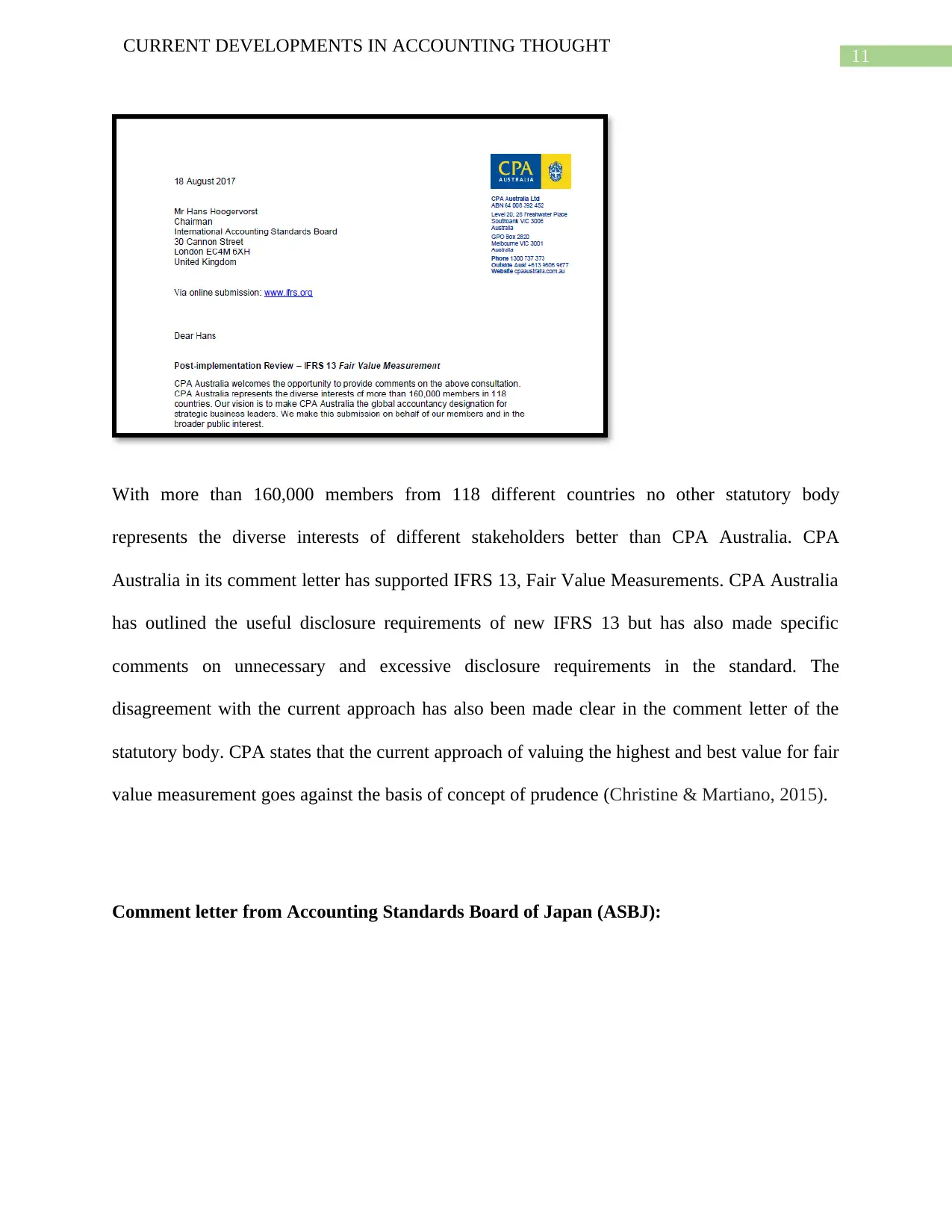
11
CURRENT DEVELOPMENTS IN ACCOUNTING THOUGHT
With more than 160,000 members from 118 different countries no other statutory body
represents the diverse interests of different stakeholders better than CPA Australia. CPA
Australia in its comment letter has supported IFRS 13, Fair Value Measurements. CPA Australia
has outlined the useful disclosure requirements of new IFRS 13 but has also made specific
comments on unnecessary and excessive disclosure requirements in the standard. The
disagreement with the current approach has also been made clear in the comment letter of the
statutory body. CPA states that the current approach of valuing the highest and best value for fair
value measurement goes against the basis of concept of prudence (Christine & Martiano, 2015).
Comment letter from Accounting Standards Board of Japan (ASBJ):
CURRENT DEVELOPMENTS IN ACCOUNTING THOUGHT
With more than 160,000 members from 118 different countries no other statutory body
represents the diverse interests of different stakeholders better than CPA Australia. CPA
Australia in its comment letter has supported IFRS 13, Fair Value Measurements. CPA Australia
has outlined the useful disclosure requirements of new IFRS 13 but has also made specific
comments on unnecessary and excessive disclosure requirements in the standard. The
disagreement with the current approach has also been made clear in the comment letter of the
statutory body. CPA states that the current approach of valuing the highest and best value for fair
value measurement goes against the basis of concept of prudence (Christine & Martiano, 2015).
Comment letter from Accounting Standards Board of Japan (ASBJ):
⊘ This is a preview!⊘
Do you want full access?
Subscribe today to unlock all pages.

Trusted by 1+ million students worldwide
1 out of 22
Related Documents
Your All-in-One AI-Powered Toolkit for Academic Success.
+13062052269
info@desklib.com
Available 24*7 on WhatsApp / Email
![[object Object]](/_next/static/media/star-bottom.7253800d.svg)
Unlock your academic potential
Copyright © 2020–2026 A2Z Services. All Rights Reserved. Developed and managed by ZUCOL.





